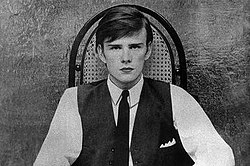There’s was always
something about Sonny Liston. Always rumours. Maybe the mob connections. Maybe the way he threw the second Ali fight, or his
weird death in Las Vegas.
 |
| Nobody punched harder |
It was as if he saw something out of the corner of his eye, a phantom, something fleeting and cruel.
Maybe he was waiting for something, a meeting that he could delay if he just
belonged somewhere for once, if he just punched hard enough, if he only endured enough pain because pain — both delivered and received — lets you know you're alive. So he tried: nobody punched harder and with more debilitating force than Sonny Liston.
He had to. He had to smash his way out of poverty and jail and racial discrimination and… you know this tune — it’s 12-bar blues but in a minor key.
People spoke of his silent stare — eyes of a corpse, face drained of blood having taken such savage beatings at so young an age. But Sonny never complained, never explained. He didn't have to — because it was always between Sonny and the Big Man, not
people. Shit, people were trouble. Best to avoid their bank accounts, their push-ups bras, their handguns. Best to fight then flee into the night.
 |
| Just as he expected - a Big nothing |
That
something he saw
, that shadow boxer, that bemused trickster who led him pawing through the black & white crowds of yesterday’s newsreels, heaving cigar smoke and screams, the women all hollow-eyed girlfriends, coiled off men’s arms, the men themselves straining veins and broken fedoras.
And so in May/65 Sonny once again met the newly minted Muhammad Ali. (Of all the men I must battle, why O Lord do you face me with the best of them — ever?)
 |
| Iconic photo. Ali/Clay over Liston |
Previously beaten by Ali even though he had managed to lace nitric acid on his gloves and grind them into Ali’s stinging eyes, this time Sonny said screw it and took the fall just half-way into the first round.
First round? Sure. If you’re going to drop, why take a beating? Makes sense. They called him a stooge — and a lot worse. Some people called it a
phantom punch. They had no idea how right they were. Sonny had seen the Phantom all his life... leaning in the corner of a jail cell, by his bed as he lay back, cut and gutted, having survived one more predator. Anyway, some say the mob had threatened his wife and children - which makes sense because Sonny Liston was no quitter.
After that loss he boxed in Europe, did well, but never got back to The Garden. Meanwhile, Ali danced around him and out into the whirling kaleidoscopic stratosphere of 1960s pop culture heroism. Sonny couldn’t shake the grey smell of backstreet whore houses, always the shadows, the pay phone whispers, the film-noir headlights sweeping his motel window and god knows who’s going to get out of the car with something heavy in their hands.
 |
| "Lord, you made the night too long" |
It's appropriate Sonny died alone in Las Vegas, a city that always been uneasy around strength. The Phantom raised His fist for a final, merciful blow. And Sonny lowered his arms, unguarded now, exposing his ragged soul, and closed his eyes to Nothing, just as he had expected.
A Big Nothing.
And then down he fell for the
infinite count to a white sea of foam canvas, he a silent cipher, just damaged goods drifting over the planet, more a ghost than a demon, less a man than a wordless tale of a brave spirit fighting forever under endless blows from unseen fists.




















